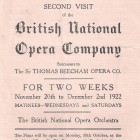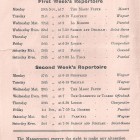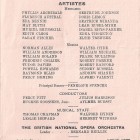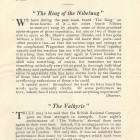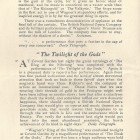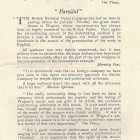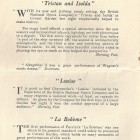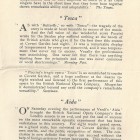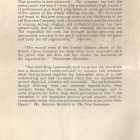British National Opera Company
The BNOC was established in 1922 as the result of the Beecham Opera Company going into liquidation in December 1920. Leading performers of the day moved from that previous operator and became directors pf BNOC. These included the conductors Percy Pitt and Aylmer Buesst, soprano Agnes Nicholls, and tenor Walter Hyde with basses Robert Radford and Norman Allin. Operations were able to start with a wide and large-scale repertoire as the result of lavish sets and costumes from Sir Thomas Beecham's company also passing to the new set-up.
Initially Percy Pitt was the company's artistic director, succeeded in 1924 by the Wagnerian baritone Frederic Austin, when Pitt moved to the BBC. The first season opened at the Alhambra Theatre, Bradford on 6 February 1922, beginning with Aïda.
On 6 March 1922 the company moved to Scotland, opening a three-week season in Edinburgh at the Lyceum. Promotional material is displayed below, along with extracts from reviews of earlier performances at Covent Garden. What impact the performances made in the rather more intimate Edinburgh Lyceum can only be imagined.
In the autumn Glasgow was added to the schedule. Visits to the central belt continued until 1927 when Dundee and Aberdeen also received performances. By 1928, with the great economic depression under way, the company still visited three of those cities. The Dundee King's had become a cinema, so was not available.
In its early seasons BNOC's London visits were played at Covent Garden, but in 1924 that house began its international seasons, so BNOC transferred to His Majesty's in the Haymarket. It was, however, like Carl Rosa, an organisation thet toured extensively in the provinces.
While the mainstay of the company's repertoire remained the popular works of Wagner, Verdi and Puccini, several unfamiliar pieces by British composers were introduced. These included operas by Ralph Vaughan Williams (Hugh the Drover); Gustav Holst (Savitri, The Perfect Fool, At the Boar's Head); Dame Ethel Smyth (The Boatswain's Mate, Fête Galante); Rutland Boughton (Alkestis); Sir Alexander Mackenzie (The Eve of St John); and Ernest Bryson (The Leper's Flute).
BNOC's serious financial difficulties in 1928 included an accumulated deficit of £5000. Despite the fact that during its last year it had contributed Entertainment Tax of £17000 to the government's coffers, the company ceased operations,
Its productiion, sets and costumes were taken over by the Covent Garden Opera Company, which was able to return to Scotland very quickly in 1929.
- Aïda
-
1922 - Aïda
1923 - Aïda
1924 - Aïda
1925 - Aïda
1926 - Aïda
1927 - Aïda
1928 - Aïda
- Alkestis
-
1924 - Alkestis
- At the Boar's Head
-
1925 - At the Boar's Head
- Barber of Seville
-
1927 - Barbiere di Siviglia
1928 - Barbiere di Siviglia
- Boatswain's Mate
-
1923 - Boatswain's Mate
- Bohème
-
1922 - Bohème
1923 - Bohème
1924 - Bohème
1925 - Bohème
1926 - Bohème
1927 - Bohème
1928 - Bohème
- Carmen
-
1922 - Carmen
1923 - Carmen
1924 - Carmen
1925 - Carmen
1926 - Carmen
1927 - Carmen
1928 - Carmen
- Cavalleria Rusticana
-
1922 - Cavalleria Rusticana
1923 - Cavalleria Rusticana
1925 - Cavalleria Rusticana
1928 - Cavalleria Rusticana
- Coffee Cantata
-
1925 - Coffee Cantata
- Enfant Prodigue
-
1922 - Enfant Prodigue
- Eve of St John
-
1924 - Eve of St John
- Falstaff
-
1928 - Falstaff
- Faust
-
1922 - Faust
1923 - Faust
1924 - Faust
1926 - Faust
1928 - Faust
- Fête Galante
-
1923 - Fête Galante
- Gianni Schicchi
-
1923 - Gianni Schicchi
1924 - Gianni Schicchi
1925 - Gianni Schicchi
1926 - Gianni Schicchi
1927 - Gianni Schicchi
- Golden Cockerel
-
1924 - Golden Cockerel
1925 - Golden Cockerel
- Goldsmith of Toledo
-
1922 - Goldsmith of Toledo
- Hansel and Gretel
-
1923 - Hansel and Gretel
1926 - Hansel and Gretel
- Hugh the Drover
-
1924 - Hugh the Drover
1925 - Hugh the Drover
1926 - Hugh the Drover
- Leper's Flute
-
1926 - Leper's Flute
- Lohengrin
-
1928 - Lohengrin
- Louise
-
1922 - Louise
1923 - Louise
- Madama Butterfly
-
1922 - Madam Butterfly
1923 - Madam Butterfly
1924 - Madam Butterfly
1925 - Madam Butterfly
1926 - Madam Butterfly
1926 - Madam Butterfly
1927 - Madam Butterfly
1928 - Madam Butterfly
- Magic Flute
-
1922 - Zauberflöte
1923 - Zauberflöte
1924 - Zauberflöte
1925 - Zauberflöte
1927 - Zauberflöte
1928 - Zauberflöte
- Manon
-
1927 - Manon
1928 - Manon
- Marriage of Figaro
-
1923 - Nozze di Figaro
1924 - Nozze di Figaro
1926 - Nozze di Figaro
1927 - Nozze di Figaro
- Meistersinger von Nürnberg
-
1922 - Mastersingers of Nuremberg
1923 - Mastersingers of Nuremberg
1924 - Mastersingers of Nuremberg
1925 - Mastersingers of Nuremberg
1926 - Mastersingers of Nuremberg
1927 - Mastersingers of Nuremberg
1928 - Mastersingers of Nuremberg
- Otello
-
1923 - Otello
1925 - Otello
1926 - Otello
- Pagliacci
-
1922 - Pagliacci
1923 - Pagliacci
1924 - Pagliacci
1925 - Pagliacci
1926 - Pagliacci
1927 - Pagliacci
1928 - Pagliacci
- Parsifal
-
1922 - Parsifal
1926 - Parsifal
- Pelléas et Mélisande
-
1923 - Pelléas and Mélisande
1924 - Pelléas and Mélisande
- Perfect Fool
-
1923 - Perfect Fool
1924 - Perfect Fool
- Phoebus and Pan
-
1923 - Phoebus and Pan
- Rhinegold
-
1923 - Rheingold
- Rigoletto
-
1925 - Rigoletto
1926 - Rigoletto
- Roméo et Juliette
-
1926 - Romeo and Juliet
- Samson et Dalila
-
1922 - Samson and Delilah
1923 - Samson and Delilah
1927 - Samson and Delilah
- Savitri
-
1923 - Savitri
- Seraglio
-
1923 - Entführung aus dem Serail
- Siegfried
-
1922 - Siegfried
1923 - Siegfried
1924 - Siegfried
- Tales of Hoffmann
-
1924 - Tales of Hoffmann
1925 - Tales of Hoffmann
1926 - Tales of Hoffmann
- Tannhäuser
-
1922 - Tannhäuser
1923 - Tannhäuser
1924 - Tannhäuser
1925 - Tannhäuser
1926 - Tannhäuser
1927 - Tannhäuser
1928 - Tannhäuser
- Tosca
-
1922 - Tosca
1923 - Tosca
1925 - Tosca
1926 - Tosca
- Tristan and Isolde
-
1922 - Tristan und Isolde
1925 - Tristan und Isolde
1926 - Tristan und Isolde
- Trovatore
-
1923 - Trovatore
1928 - Trovatore
- Twilight of the Gods
-
1923 - Götterdämmerung
1927 - Götterdämmerung
- Walküre
-
1922 - Valkyrie
1923 - Valkyrie
1927 - Valkyrie
